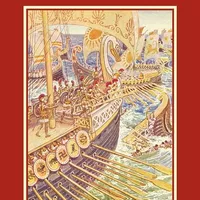21. The Rise of Carthage
"Because ye are Sons of the Blood and call me Mother still." —KIPLING.
While the mother country, Phœnicia, was falling, by reason of Nebuchadnezzar's siege of Tyre, her young colony of Carthage, was rapidly springing into fame. She was destined to eclipse even the glories of Tyre. Once indeed,—not long after the fall of Tyre,—while Carthage was busy extending her dominions, she had a narrow escape from destruction.
Cambyses, King of Persia, had conquered Egypt with such ease, that he was looking about for another country to lay low. Carthage was great enough to prove a danger, so he determined to march against that city. But it was two thousand miles away by land, and by sea alone could he hope to reach it. His fleet was made up of Phœnician ships, and manned by Phœnician sailors. These refused to take part in the expedition against their own kith and kin.
"We are bound to the Carthaginians," they said, "by solemn oaths. They too are our children, and it would be wicked to make war against them." And Cambyses had to be content with this answer, and give up his cherished plan of reducing Carthage.
Like the Phœnicians, the Carthaginians soon established colonies across the seas; but they took care to protect them. The Great Sea was no longer free to them to come and go as they liked. Greek ships sailed the seas, Greek colonies had sprung up along the coasts.
Nevertheless they owned colonies on the coast of Africa; the islands of Sardinia, Malta, and Corsica were theirs, they owned the group of Balearic Islands, while a great part of Southern Spain was under their rule. They had inherited a spirit of commerce from the parent State.
So the colony of Carthage had all the energy and trading instincts of the mother country. She held her own on the Great Sea, at a time when rival ships were sailing the sea, and Greece and Rome were clamouring for ports and colonies around the coast. She held her own till greed of conquest seized her, and in trying to get more than she could keep, she fell.
The story of her fall will be told later.

